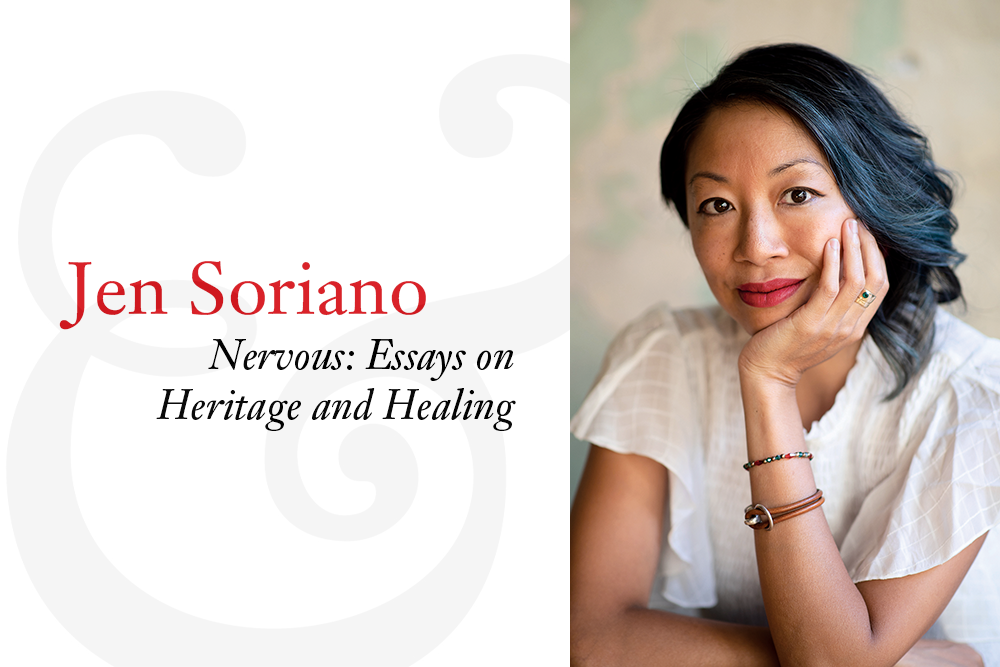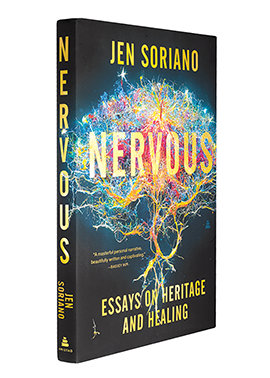Nervous: Essays on Heritage and Healing (Amistad, August), an essay collection about the impacts of transgenerational trauma, blending neuroscience, sociology, history, and family stories to explore the secrets of the human body—centering neurodiverse, disabled, and genderqueer bodies of color—in a journey to understanding and transformation. Agent: Samantha Shea of Georges Borchardt, Inc. Editors: Jennifer Baker and Francesca Walker. First Lines: “We are nervous beings, in nervous nations, at an increasingly nervous time. I wrote this book for those of us who have felt crazy and alone. For those of us who have been told to forget about the past, to stop being weak, and to swallow our pain. For all of us with a knowing body. For babaylan who remember a time before silence. For pearls in their shells seeking conditions to shine. My story is just one ripple in an emerging ecosystem of interdependence, where we don’t have to bear generational pain alone.” (Credit: Naomi Ishisaka)
![]()
I was a moody teenager and young adult who never liked small talk and viewed happy hour as a special form of torture. For a long time I preferred writing in my journal to engaging verbally with other human beings. I now know, through both somatic therapy and through the process of writing Nervous, that this is in part because I had a lot of things to work through that aren’t exactly popular topics over chips and salsa and a beer. So writing, for me, has been less of a choice and a career than a necessary form of being. Writing nonfiction has allowed me to process experiences of intractable chronic pain, mystical connections to ancestors, musings about historical trauma, and personal theories of well-being and social medicine. I wrote Nervous because these threads are difficult to weave together in anything less than a book-length work.
It took me eight years to create Nervous. I came up with the idea after birthing my first and only child and after receiving a diagnosis of central sensitivity syndrome (CSS), an umbrella category of conditions in which the central nervous system amplifies pain signals across bodily systems. This was an irony too great not to explore: I was the child of a neurosurgeon, a nervous system expert, but it turned out that the mysterious chronic pain I had lived with for most of my life stemmed from a nervous system disorder.
In 2015 I bought a spiral-bound notebook from the drugstore, scrawled the word nervous on the cover, and wrote on the first lines of the first page: “Why do we, nervous system experts included, have such a small understanding of the central system that governs all of our bodies?” On the next lines I wrote, “Diagnosis is not the same as root cause. What is the root cause of my nervous system dis-ease?”
To begin to answer these questions, I enrolled in an online class on the neuroscience of everyday life. I also enrolled in a low-residency MFA program at the Rainier Writing Workshop while parenting and working full-time.
Over the next three years, under the mentorship of Rick Barot, Julie Marie Wade, Kent Meyers, and Barrie Jean Borich, I learned vital elements of craft that went into Nervous. Barrie expertly guided my MFA thesis, which became the first of dozens of manuscript drafts. When Rick read my thesis he said, “This is going to be a book in five years.” What I heard was: “This is so bad it needs five years of revision.” Now I know he meant: “This is good enough to be a book, and book editing and production take a long time.” And he was right.
The five years between thesis and book, from 2018 to 2023, involved a number of organizations and individuals who helped me to develop the questions I explored and ultimately to get Nervous published. The Jack Jones Literary Arts retreat introduced me to my agent, who was instrumental in helping me revise the book proposal that sold. Minal Hajratwala of the Unicorn Authors Club coached me through turning the proposal into essays. My editors at Amistad went into the trenches of clarifying essay themes at the structure and sentence levels. The HarperCollins union went on strike and won better wages, then returned to work with a renewed commitment to produce beautiful, top-quality books. I believe they wholeheartedly delivered on this commitment with the production of Nervous.
My book came out shortly after my forty-seventh birthday, which in the industry makes me a late bloomer. But personal nonfiction gestates at the pace of lived experience. I wouldn’t have been able to write Nervous as a younger person. I think Nervous is an example of how there is no early or late for book debuts—there is only right on time.











